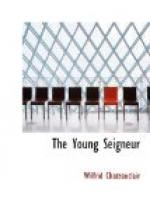After the equipment of the ideal Canadians, Chamilly proceeded to describe their work. They were to see its pattern above them in the skies—The Perfect Nation.
Among themselves a few great ideas were to be striven for: “We must be One People,” “Canada must be Perfectly Independent:” “There must be No Proletariat”
The principle of government was to be “Government by the Best Intelligence.”
“We must try to amend unfair distributions of wealth. Yet not to take from the rich, but give to the poor. Fortunes should be looked upon as national, and we should seek means to bring the wealthy to apply their fortunes to patriotic uses. The surroundings of the poor should be made beautiful. No labour should be wasted. Men should learn several occupations, and Government find means of instant communication between those who would work and those who would employ. The lot of the poor must not be made hopeless from generation to generation!”
The next demand of the Ideal was, “There must be No Vice.”
“The difficulties!” sighed Chrysler.
“We ought to be ashamed to complain till we have done as well as Sweden.”
“Again, we must stamp our action with the Spirit of Organization. The nation must work all together as a whole. The public plan must be clearly disseminated, and especially the aim ’To do pre-eminently well our portion of the improvement of the world.’ Consecrated by our ideal also we must seek to draw together, and foster a national distinctiveness. Canada must mean to us the Sacred Country, and our young men learn to weigh truly the value of such living against foreign advantages. For there is no surety of any excellence equal to a national atmosphere of it. They have always been artists in Italy; they have always been sternly free in Scotland: for a word of glory the French rush into the smoke of battle: the Englishman is a success in courage and practicality; the German has not given his existence in vain to thoroughness; nor the American to business. Let us make to ourselves proper customs and peculiarities, like the good old New Year’s call, the Winter Carnival, the snow-shoe costume, and a secular procession of St. Jean Baptiste. Tradition too! Why should we forget the virtues of our fathers; or perhaps still better their faults? Let the man who was a hero—Daulac; Brock; the twelve who sortied at Lacolle Mill; our deathless three hundred of Chateauguay,—never to be forgotten. Have them in our books, our school books, our buildings. Make a Fund for Tablets; so that the people may read everywhere: ’Here died McGee, who loved this nation.’ ‘Papineau spoke here.’ ’In this house dwelt Heavysege.’ So might all Canada be a Quebec of memories.”
He held that the office of our literature and art was to express the spirit of our work. “Nor let the poet,” he said, “find the keystone of our spirits dull; let him not fear he sings a vain song when he leaves that voice lingering in some vale of ours that conjures about it forever its moment of richest beauty and romance.”




